
Economic history is the study of history using methodological tools from economics or with a special attention to economic phenomena. Research is conducted using a combination of historical methods, statistical methods and the application of economic theory to historical situations and institutions. The field can encompass a wide variety of topics, including equality, finance, technology, labour, and business. It emphasizes historicizing the economy itself, analyzing it as a dynamic entity and attempting to provide insights into the way it is structured and conceived.

Joseph Eugene Stiglitz is an American New Keynesian economist, a public policy analyst, political activist, and a professor at Columbia University. He is a recipient of the Nobel Memorial Prize in Economic Sciences (2001) and the John Bates Clark Medal (1979). He is a former senior vice president and chief economist of the World Bank. He is also a former member and chairman of the US Council of Economic Advisers. He is known for his support for the Georgist public finance theory and for his critical view of the management of globalization, of laissez-faire economists, and of international institutions such as the International Monetary Fund and the World Bank.

Arthur Betz Laffer is an American economist and author who first gained prominence during the Reagan administration as a member of Reagan's Economic Policy Advisory Board (1981–1989). Laffer is best known for the Laffer curve, an illustration of the theory that there exists some tax rate between 0% and 100% that will result in maximum tax revenue for government. In certain circumstances, this would allow governments to cut taxes, and simultaneously increase revenue and economic growth.

Paul Robin Krugman is an American New Keynesian economist who is the Distinguished Professor of Economics at the Graduate Center of the City University of New York. He was a columnist for The New York Times from 2000 to 2024. In 2008, Krugman was the sole winner of the Nobel Memorial Prize in Economic Sciences for his contributions to new trade theory and new economic geography. The Prize Committee cited Krugman's work explaining the patterns of international trade and the geographic distribution of economic activity, by examining the effects of economies of scale and of consumer preferences for diverse goods and services.

The Pax Mongolica, less often known as Pax Tatarica, is a historiographical term modeled after the original phrase Pax Romana which describes the stabilizing effects of the conquests of the Mongol Empire on the social, cultural and economic life of the inhabitants of the vast Eurasian territory that the Mongols conquered in the 13th and 14th centuries. The term is used to describe the eased communication and commerce that the unified administration helped to create and the period of relative peace that followed the Mongols' vast and violent conquests.
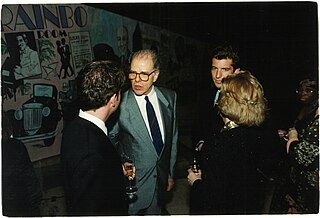
William Joseph Kennedy is an American writer and journalist who won the 1984 Pulitzer Prize for his 1983 novel Ironweed.

Richard Miller Flanagan is an Australian writer, who won the 2014 Man Booker Prize for his novel The Narrow Road to the Deep North and the 2024 Baillie Gifford Prize for Question 7, making him the first writer in history to win both Britain's major fiction and non-fiction prizes.
Sir William Hartley Hume Shawcross is a British journalist, writer, and broadcaster. He is the incumbent Commissioner for Public Appointments. From 2012 to 2018 he chaired the Charity Commission for England and Wales.

Living History is a 2003 memoir by Hillary Clinton. It was written when she was a sitting Senator from New York.

Michael Monroe Lewis is an American author and financial journalist. He has also been a contributing editor to Vanity Fair since 2009, writing mostly on business, finance, and economics. He is known for his nonfiction work, particularly his coverage of financial crises and behavioral finance.

Ha-Joon Chang is a South Korean economist and academic. Chang specialises in institutional economics and development, and lectured in economics at the University of Cambridge from 1990–2021 before becoming professor of economics at the School of Oriental and African Studies (SOAS) in 2022. Chang is the author of several bestselling books on economics and development policy, most notably Kicking Away the Ladder: Development Strategy in Historical Perspective (2002). In 2013, Prospect magazine ranked Chang as one of the top 20 World Thinkers.
William J. Bernstein is an American financial theorist and neurologist. His research is in the field of modern portfolio theory and he has published books for individual investors who wish to manage their own equity portfolios, as well as history. He lives in Portland, Oregon. His bestselling books include The Birth of Plenty and A Splendid Exchange.
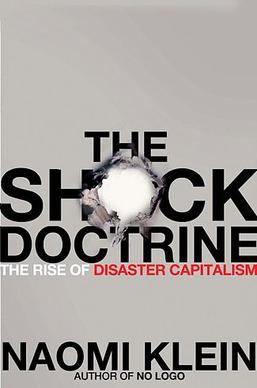
The Shock Doctrine: The Rise of Disaster Capitalism is a 2007 book by Canadian author and social activist Naomi Klein. In the book, Klein argues that neoliberal economic policies promoted by Milton Friedman and the Chicago School of Economics have risen to global prominence because of a deliberate strategy she calls "disaster capitalism". In this strategy, political actors exploit the chaos of natural disasters, wars, and other crises to push through unpopular policies such as deregulation and privatization. This economic "shock therapy" favors corporate interests while disadvantaging and disenfranchising citizens when they are too distracted and overwhelmed to respond or resist effectively. The book challenges the narrative that free market capitalist policies have been welcomed by the inhabitants of regions where they have been implemented, and it argues that several man-made events, including the Iraq War, were intentionally undertaken with the goal of pushing through these unpopular policies in their wake.
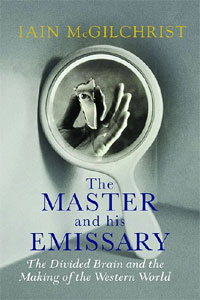
The Master and His Emissary: The Divided Brain and the Making of the Western World is a 2009 book written by psychiatrist Iain McGilchrist that deals with the specialist hemispheric functioning of the brain. The differing world views of the right and left brain have, according to the author, shaped Western culture since the time of the ancient Greek philosopher Plato, and the growing conflict between these views has implications for the way the modern world is changing. In part, McGilchrist's book, which is the product of twenty years of research, reviews the evidence of previous related research and theories, and based on this and cultural evidence, the author arrives at his own conclusions.

Money and Power: How Goldman Sachs Came to Rule the World is the third book written by William D. Cohan. It chronicles the history of Goldman Sachs, from its founding to the subprime mortgage crisis of 2008. First published as hardcover on March 29, 2011, the book has been reprinted soon thereafter on April 12, 2011, by Doubleday again. The text has been reprinted as paperback on January 10, 2012, by Penguin Books.
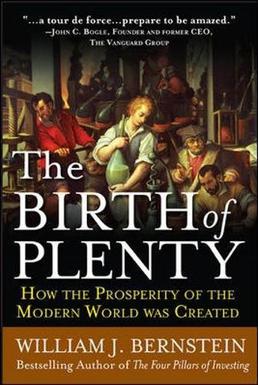
The Birth of Plenty: How the Prosperity of the Modern World Was Created is a nonfiction book on world history and economics by American author William J. Bernstein.
William L. Silber is a former chaired professor at The Stern School of Business, New York University, most recently as the Marcus Nadler Professor of Finance and Economics (2002-2019) and before that as the Abraham Gitlow Professor of Economics and Finance (1990-2002). He has served as Senior Economist with the President's Council of Economic Advisors, was a member of the Economic Advisory Panel of the Federal Reserve Bank of New York, and has published eight books, including a college textbook, Principles of Money, Banking and Financial Markets, with Lawrence Ritter and Gregory Udell, that has gone through twelve editions. His most notable contributions have been in monetary economics, finance, and economic history, where he has shown the importance of analyzing institutional detail before applying statistical techniques to historical data. His analysis has also drawn on his work in the business world. He traded options and futures contracts on the Commodity Exchange and the New York Mercantile Exchange and he was a portfolio manager at the hedge fund Odyssey Partners.

Sapiens: A Brief History of Humankind is a book by Yuval Noah Harari, based on a series of lectures he taught at The Hebrew University of Jerusalem. It was first published in Hebrew in Israel in 2011, and in English in 2014. The book focuses on Homo sapiens, and surveys the history of humankind, starting from the Stone Age and going up to the 21st century. The account is situated within a framework that intersects the natural sciences with the social sciences.
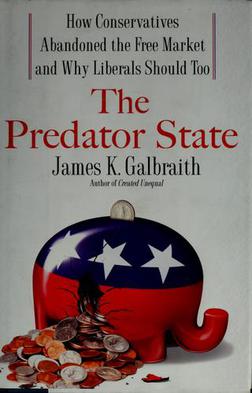
The Predator State: How Conservatives Abandoned the Free Market and Why Liberals Should Too is a book by economist James K. Galbraith, first published in 2008. The title refers to how in US society, as Galbraith sees it, public institutions have been subverted to serve private profit: the "predators" being corporate elites. He argues that these corporate interests run the state "not for any ideological project—but simply in a way that would bring to them, individually and as a group, the most money.”
Ann Wroe FRSL is an English author and columnist who has been the obituaries editor of The Economist since 2003.
















